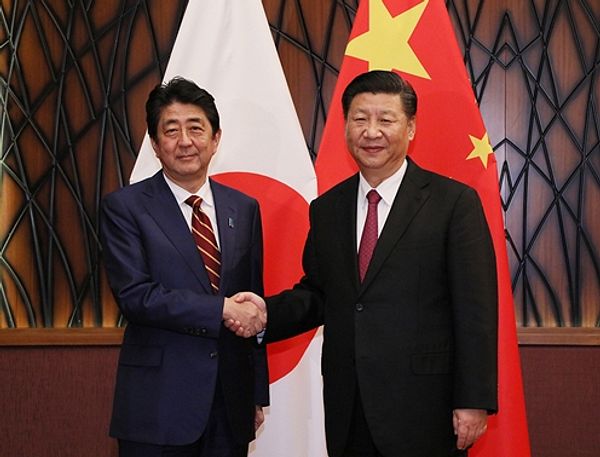
The assassination of former Prime Minister Abe Shinzo, Japan’s longest-serving leader, during a campaign event in Nara, Japan, has shocked the world. In China, which has a complicated relationship with Japan, and with Abe in particular, the sudden tragedy sparked mixed reactions.
The initial response came from China’s Foreign Ministry. Spokesperson Zhao Lijian was asked about the shooting in the regular daily press conference – at the time, Abe was critically injured but had not yet been pronounced dead. Zhao responded that China was “shocked” by the “unexpected incident.”
“We are following the updates and hope that former Prime Minister Shinzo Abe will be out of danger and recover soon. We would like to extend sympathies to his family,” Zhao said.
Of course, those hopes were not to be. Afterward, when news of Abe’s death broke, Zhao updated his statement: “We are shocked by the unexpected incident. Former Prime Minister Shinzo Abe had contributed to the improvement and growth of China-Japan relations. We express condolences and sympathies to the family of Former Prime Minister Shinzo Abe.”
A statement from China’s embassy in Japan repeated Zhao’s comments.
As of this writing, Chinese leader Xi Jinping had not issued a statement personally.
The major state media outlets – Xinhua, People’s Daily, and the English-language China Daily – ran neutral reporting simply recounting the facts of the incident. However, the state-owned Global Times stayed true to its image as a nationalistic tabloid, running a controversial commentary emphasizing that “Japanese right-wing forces may use this incident to push forward the trend of conservative transformation in Japanese politics.” The article featured a graphic image of a bloody Abe lying on the pavement immediately after the attack. Global Times drew widespread criticism for the article, and a tweet promoting it, on Twitter.
While the official reaction from China was sympathetic and careful to focus on the positive aspects of Abe’s China policy, reactions on Chinese social media were more in line with the Global Times. The news was a trending news topic on Chinese social media platforms, with videos of the attack widely shared and commented on.
As Manya Koetse reported for What’s on Weibo, anti-Japanese sentiments were rife on Weibo after the assassination, with many expressing glee that Abe was dead. Many comments called the attacker a “hero” and suggested China should remember the assassination date as a “historic day.” A Chinese reporter who became emotional when giving an interview about the attack was roundly denounced by social media users, with many accusing her of not being Chinese.
“You are crying over a Japanese right-winger who has no respect for the history of the invasion of China, a Japanese who has no respect for the Chinese!” one commenter wrote, in Koetse’s translation.
Koetse also noted, however, that other commenters posted candle emojis in sympathy, and some pushed back against the idea of taking glee in a brutal murder.
In the daily press conference, Zhao was also asked about the response on Chinese social media to Abe’s death. He responded by saying he would not comment “on the remarks posted online.”
“I’ve just stated the position of the Chinese government. This unexpected incident should not be linked to China-Japan relations,” Zhao said.
Abe was an extremely controversial figure in China, due to his tendency to downplay Japan’s wartime atrocities as well as his concerted efforts to loosen restrictions on Japan’s military. When Abe visited the Yasukuni Shrine in December 2013 – a Shinto shrine honoring Japanese who gave their lives to the country, including war criminals. At the time, Chinese officials said Abe’s visit to the shrine “severely damages the political foundations of China-Japan relations.” Throughout his tenure, Chinese government spokespeople repeatedly accused him of “distorting history” while seeking to remilitarize Japan.
More broadly, Abe’s geopolitical moves firmly positioned Japan as a key node in the growing coalition to push back against China. Abe was the original mastermind behind the Quad and the “Indo-Pacific” concept itself, both of which are now centerpieces of the U.S. strategy to counter China. Current Prime Minister Kishida Fumio has largely carried on Abe’s legacy on foreign policy issues.
Relations between China and Japan essentially entered a deep freeze during Abe’s tenure. There were some attempts toward a thaw made in 2018, culminating in Abe’s first state visit to China. Xi Jinping was supposed to make his own visit to Japan in 2020, but the COVID-19 pandemic intervened. The limited rapprochement in China-Japan relations did not last long, however – unsurprising, considering that neither side had really altered their policies to begin with.
China Reacts to Abe Shinzo Assassination
Source: Frappler

0 Comments